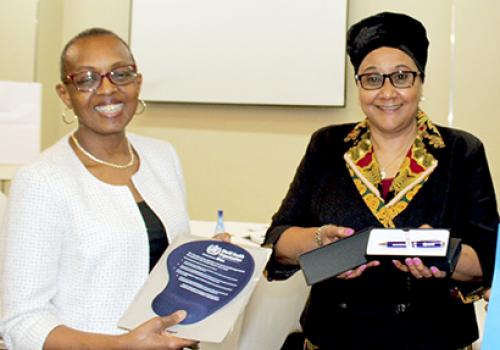The Executive Secretary of the Southern African Development Community (SADC), H.E. Dr. Stergomena Lawrence Tax held a consultative meeting to discuss partnerships in promoting health with the World Health Organisation (WHO) Regional Director for Africa, Dr. Matshidiso Moeti on 4th October 2017, in Gaborone, Botswana.
During the meeting, the two parties shared ideas on collaborative initiatives to advance health issues in the SADC region. Dr. Moeti said that the WHO Regional Office for Africa (WHO-AFRO) will continue to collaborate with SADC and provide support towards the identified Priority areas which are directed to moving towards universal health coverage.
This will be done in line with among others, the SADC Protocol on Health, and SADC Priorities as contained in the SADC Revised Regional Indicative Strategic Plan 2005 – 2020 which focusses on Industrialization, Regional Integration and Sustainable Development Goal Number 3 on Health.
The WHO will also provide support in promoting health through the life-course, Control of Communicable Disease; Preparedness, surveillance and response during emergencies by coordinating the health response in support of countries, undertaking risk assessments; identifying priorities and setting strategies; providing critical technical guidance, supplies and financial resources as well as monitoring the health situation.
The Support from WHO will assure the Region’s availability of equitable integrated people-centered health services at an affordable price; facilitate access to affordable, safe and effective health technologies; and to strengthen health information systems and evidence-based policy-making in the Region.
Dr. Tax said that the courtesy visit by the WHO AFRO Regional Director to the SADC Region was timely as the Region was experiencing an upsurge of Non-communicable diseases which can be countered through consolidated and strategic Collaborative Partnership and Networking. “We need an integrated approach that will also ensure that the issue of antimicrobial resistance in communicable diseases is addressed through shared alert response with a view to focus on Regional a programme and overarching National Priorities by utilizing the Principle of Subsidiarity”, Dr Tax added.
The WHO currently supports countries across the region in mitigating Non-communicable diseases including heart disease, stroke, cancer, diabetes and chronic lung disease, and mental health conditions which together with violence and injuries - are collectively responsible for more than 70% of all deaths worldwide and an important area for WHO’s leadership since the consequences of these diseases reach beyond the health sector and solutions require more than a system that prevents and treats disease.
In 2004, SADC Secretariat and the WHO-AFRO signed a Memorandum of Understanding (MoU) which provided for provision of technical assistance to the SADC Secretariat on matters critical to Public Health and engaging where joint action was needed.
Other components of that MoU include; shaping the research agenda and stimulating the generation; translation and dissemination of valuable knowledge; setting norms and standards and promoting and monitoring their implementation; articulating ethical and evidence-based policy options; providing technical support, catalyzing change, and building sustainable institutional capacity; and monitoring the health situation and assessing SADC Regional Health Agenda that is ascribed in the SADC Protocol on Health.
In line with the exiting MoU between SADC and WHO, and based on the discussion the following were agreed upon:
- Joint planning of Technical Officers from SADC Secretariat and WHO-AFRO in identifying areas of collaboration in Cross Border Communicable Diseases programme, in particular, in the Elimination of Malaria and life-course Control of Communicable disease; Provision of Training in Preparedness, surveillance and response during emergencies; coordinating the Pooled Procurement of Medicines and Health Commodities.
- Jointly identifying players in the Public, Private, and Non-State Actors, and developing a detailed work plan and monitoring framework.
- Holding regular joint meetings to assess progress against the work plan and provide guidance.

